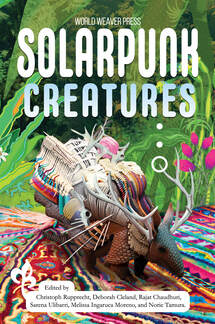 Guest Blog by Kai Holmwood When I first read Joan Didion’s “On Morality,” what stuck with me wasn’t the point she was making, but the atmosphere of the desert in her writing. Somehow, in that essay nominally about morality, she captured the way I always felt while camping in Death Valley or the Mojave or the Sonoran on July road trips with my dad as he whispered in my ear of animals I’d never see and pointed out tire tracks, which he claimed would take a hundred years to fade, scarring the otherwise seemingly untouched landscape. “On Morality” might be the only piece of writing I’ve read that reproduces the feeling of the desert in the way I remember experiencing it. One line in particular from that essay stuck with me: Didion writes of the “graphic litanies of the grief awaiting those who failed in their loyalties to each other.” As someone growing up in the era of climate change, I always heard that line on a broader level, in the sense that we—by which, in this case, I mean to include myself in the globally privileged who disproportionately contribute to climate change while remaining disproportionately unaffected by it—have failed in our loyalties. Now we—the broadest possible “we,” all of us, human and nonhuman alike—are facing litanies of grief as a result. When you grow up in California, you can’t help but develop some instinctive fixation on water. There’s the ocean, of course, in its sunny southern laughter and its crashing northern grief. There’s the seemingly constant drought. There are the helicopters scooping water from nearby lakes to dump on wildfires. There are dusty signs by the highway announcing “NO WATER = NO JOBS.” There’s the constant uproar about a certain company bottling and selling mountain water even as the parched state wilts. As a fifth-generation Californian, when I think of the future, I think first and foremost about water. The issue of water, the feeling of Joan Didion’s desert, and the question of those failed loyalties to each other all swirled together in my mind into one image: the Sonoran Desert, personified, trying to save herself in a world that has abandoned and betrayed her. The question, of course, was what would happen if we fundamentally honored our loyalties to each other, human and non-human alike. What would happen if, in some future we might still reach, we chose to work with the desert instead of fighting against it? What if the human “we” chose loyalty, even to seemingly inhospitable environments, over self-interest? “Sonora’s Journey” offers one imagined answer. My playlist while writing this story (approximately in order; I usually listen obsessively to one song at a time until I move onto the next section/song): Calling You (Jevetta Steele) Coming Back to You (written by Leonard Cohen, performed by Trisha Yearwood) Hold On (Tom Waits, performed by Madison Cunningham) Ballad of the Absent Mare (Leonard Cohen) Ice Age (Hawksley Workman) See the Fire in Your Eyes (Red Dead Redemption 2, performed by Gustavo Steiner)
Kai Holmwood, a fifth-generation Californian, has been a freelance nonfiction writer for over a decade. She recently completed a Master of Writing degree at the University of Canterbury. She, her husband and their two-toothed former street cat, Halloumi, split their time between New Zealand and Portugal.
0 Comments
Your comment will be posted after it is approved.
Leave a Reply. |
World Weaver PressPublishing fantasy, paranormal, and science fiction. Archives
February 2024
|
- Home
-
Books
-
All Books
>
- Beyond the Glass Slipper
- Bite Somebody
- Bite Somebody Else
- Black Pearl Dreaming
- Cassandra Complex
- Causality Loop
- Clockwork, Curses, and Coal
- Continuum
- Corvidae
- Cursed: Wickedly Fun Stories
- Dream Eater
- Equus
- Fae
- Falling of the Moon
- Far Orbit
- Far Orbit Apogee
- Fractured Days
- Frozen Fairy Tales
- Glass and Gardens: Solarpunk Summers
- Glass and Gardens: Solarpunk Winters
- Grandmother Paradox
- Grimm, Grit, and Gasoline
- Haunted Housewives
- Heir to the Lamp
- He Sees You When He's Creepin': Tales of Krampus
- Into the Moonless Night
- Jack Jetstark's Intergalactic Freakshow
- King of Ash and Bones (ebook)
- Krampusnacht
- Last Dream of Her Mortal Soul
- Meddlers of Moonshine
- Mothers of Enchantment
- Mrs Claus
- Multispecies Cities
- Murder in the Generative Kitchen
- Recognize Fascism
- Scarecrow
- Sirens
- Shards of History
- Shattered Fates
- Skull and Pestle
- Solarpunk (Translation)
- Solarpunk Creatures
- Solomon's Bell
- SonofaWitch!
- Speculative Story Bites
- Trenchcoats, Towers, and Trolls
- Weredog Whisperer
- Wolves and Witches
- Anthologies and Collections
- Novels
- Novellas
- Fairy Tale
- Fantasy
- Romance
- Science Fiction
- Urban/Contemporary Fantasy
- Young Adult SFF
-
All Books
>
- Blog
- About
- Contact
- Press / Publicity
- Newsletter Signup
- Privacy Policy
- Store

 RSS Feed
RSS Feed